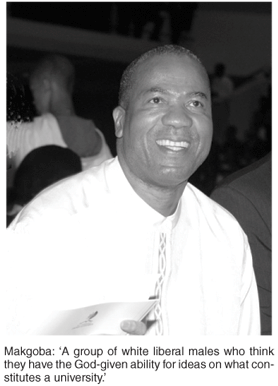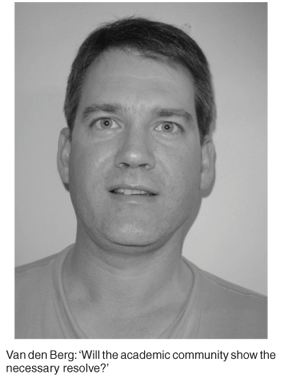Servicios Personalizados
Articulo
Indicadores
Links relacionados
-
 Citado por Google
Citado por Google -
 Similares en Google
Similares en Google
Compartir
South African Journal of Science
versión On-line ISSN 1996-7489
versión impresa ISSN 0038-2353
S. Afr. j. sci. vol.105 no.5-6 Pretoria may./jun. 2009
NEWS
Tip-toeing around Vice-Chancellor Makgoba
Craig McKune
Science journalist based in Cape Town
The week before the report investigating governance and academic freedom at the University of KwaZulu-Natal was tabled at its senate meeting on May 27, council chair Mac Mia announced the renewal of vice-chancellor Malegapuru Makgoba's five-year contract. While the 90-page report effectively exonerated Makgoba of any wrongdoing, its credibility has been widely questioned, particularly as senate's representatives on the committee were not elected, but were appointed by the university's council.
The committee was appointed on December 12 last year, following heated controversy around Makgoba's management style, in particular his stifling debate about institutional matters. The matter came to a head after Makgoba twice declined to table an official Science and Agriculture faculty submission on academic freedom at the institution, in the face of senate resolutions requiring it be tabled. Consequently, two of the faculty's representatives on senate and co-authors of the report, physicist Nithaya Chetty and mathematician John van den Berg, became entangled in conflict with Makgoba. This resulted in Chetty's resignation, and van den Berg signing a settlement terminating disciplinary hearings against him (SAJS 105, 5–6; 2009).
The committee comprised four council members, three from senate and an independent observer, former public protector Selby Baqwa SC. Its terms of reference were to investigate whether the university's governance structures and processes impeded academic freedom and freedom of expression; and whether its dispute resolution mechanisms fostered 'a culture of hostility'. Representations were heard from 103 respondents.
Highlighting the difficulty in defining academic freedom and freedom of expression, the committee found that 'a sector within the university' feared that speaking out on institutional matters could result in litigation against staff. It declared that 'The right to criticise management and call for clarification of procedure may or may not fall within the concept of academic freedom, but the committee accepts that these elements interlink and that the proper approach would always be to err in favour of protection of the right to freedom of expression rather than a limitation thereof.'
The committee was tough on UKZN's dispute-resolution mechanisms, finding that disciplinary measures had in the past been applied inconsistently and often harshly: 'The committee accepts that steps have to be taken to make litigation a last resort in any disciplinary matter.'
But the report placed heavy emphasis on the role of 'race, racism and transformation' in shaping disputes, particular in the aftermath of the merger between the University of Durban-Westville and the University of Natal, which resulted in the formation of UKZN in 2004: 'Submissions spoke of experiences of both overt and covert racism, which at times intersected with the debate around academic freedom... (The university) should develop a deliberate agenda to confront issues of race, racism and transformation.'
Chetty, now an associate professor at the University of Pretoria, said that while he held all the members of the committee in high esteem, he thought that the process would have been more credible if the committee had been more fairly and openly constituted. 'Many of the issues facing UKZN involve the operations of the senate and the council itself... so, there is a sense that the committee, which was constituted by the executive of the council, was not capacitated to look impartially at all aspects of its brief.' As a result, he said, the committee 'tip-toed around sensitive issues in the report'.
Jane Duncan, professor of media and information society at Rhodes University, shares this concern: 'Right from the start we were concerned about the composition of the committee.' She said the committee should have been established independently of council and included more members external to the university, so that council itself could have been investigated where necessary.
Duncan felt the report had 'sidestepped central issues' and adopted a 'self-serving' definition of academic freedom. She said UNESCO's 1997 definition would have been more appropriate, which specifies the rights of academics 'to express freely their opinion about the institution or system in which they work' and 'from institutional censorship'. Duncan said the committee's finding of 'a perceived threat to academic freedom' was inadequate: 'Either the threat to academic freedom exists or it doesn't. The committee's role was to find whether or not it exists, and it has not fulfilled this mandate.'

Rather than examining how the university executive had dealt with specific issues, such as the Science and Agriculture faculty submission on academic freedom, the report deferred to UKZN's 'vulnerable' post-merger environment: 'In less vulnerable situations, an incident of a document that should or should not be placed on an agenda of a meeting would have not led to a series of events and a huge debate in the media because simple processes and procedures of meetings would have dealt with that issue.' Chetty says this is just an excuse for the way Makgoba, as senate chair, had handled the matter.
No evidence is provided in the report that the impasse within the senate had anything to do with the merger. The report avoids blaming any individuals for the university's predicament. But a so-called 'old boys club' of white males who are said to be opposed to transformation are criticised in the report for complaining about threats to academic freedom, using this as a smokescreen for their racist intent.
Apparently summarising a number of submissions, the committee reported: 'There is a calculated, coordinated and stage-managed campaign, veiled as 'academic-freedom-under-threat-at-UKZN', that is apparently directed at the person of the vice-chancellor by portraying him as authoritarian. Its 'more sinister purpose [is] the reversal of transformative change at UKZN'.'

Although Makgoba declined to speak to SAJS, he expressed remarkably similar views recently in the Mercury, claiming that 'few white men' wanted him appointed when he first took the helm at UKZN five years ago. 'It was almost like swimming in a river with hungry croco- diles. Every time you think that white liberals are your friends, they are actually your worst enemies because they are very good at pretending ... And there's a network of these people from the universities of Natal, Rhodes, Wits and Cape Town. A network of a group of white liberal males who think they have the God-given ability for ideas on what constitutes a university, on what constitutes good behaviour and values.'
Wilmot James, shadow minister on higher education and training, says this focus on race is not constructive: 'Rather than fixate on race, the university should ensure that it creatively make opportunities available to all those with academic and intellectual talent; and develop equity policies to train talented young individuals.'
In another interview in the Mercury, Makgoba expressed triumph about the committee's findings: 'For three months newspapers were being written with stories saying Makgoba this, Makgoba that, and then people are asked to come forward and provide evidence and no one comes with any evidence. A whole university was almost in a spin and it turns out there is no evidence of infringement. And then nobody is magnanimous enough to say we have made a mistake and we are sorry,' he said.
But a strong indictment on UKZN's leadership is said to be the number of top academics leaving the institution. According to the report, two submissions listed high-profile academics leaving UKZN in a 'rush for the doors'. UKZN pro-vice-chancellor for corporate communications Dasarath Chetty told SAJS that the annual turnover was 7%, which is not unusually high for a South African university. Nevertheless, the report conceded that a qualitative review of the staff leaving the university was required.
Following the tabling of the report before senate, Makgoba said in a communiqué that its findings and recommendations had been 'accepted and fully endorsed' by senate. The report has been made available to all staff and students, who were asked to give input on its implementation. Following this period of engagement, the senate would meet 'to distil all inputs so that the subsequent university actions are fully informed, enriched and owned by the whole university community', he said.

Despite his criticisms, Nithiya Chetty said that the report's actual recommendations were 'constructive and forward looking'. But he warned that the findings of similar investigations, such as a senate ad hoc committee report following strike action in 2006, had landed up 'on the scrap heap' with few of its recommendations being implemented. In particular, the 2006 report had recommended the establishment of the office of an ombud. This call was ignored by the university management, but has again been made in the committee's report.
In van den Berg's view, the fate of academic freedom lies in the hands of academics themselves: 'I think this is our responsibility. If the academic community is sufficiently forceful and insistent, then significant changes will occur. The question is: will the academic community show the necessary resolve? I hope so.'














